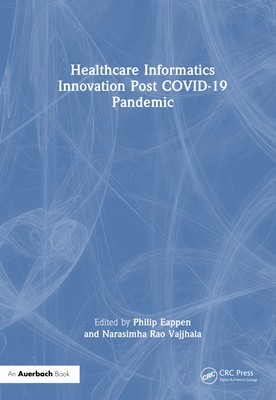
- We will send in 10–14 business days.
- Publisher: Auerbach Publications
- ISBN-10: 1032775408
- ISBN-13: 9781032775401
- Format: 17.8 x 25.4 x 1.9 cm, kieti viršeliai
- Language: English
- SAVE -10% with code: EXTRA
Healthcare Informatics Innovation Post Covid-19 Pandemic (e-book) (used book) | bookbook.eu
Reviews
Description
"This book is essential reading for those in healthcare informatics, as well as healthcare administrators, clinicians, and regulators, as they navigate the evolving landscape of healthcare post-pandemic."--Dr. Steven D. Berkshire, Professor and Director of the Doctor of Health Administration Program, Central Michigan University
The COVID-19 pandemic brought unprecedented challenges to global healthcare systems, revealing vulnerabilities and pushing the boundaries of healthcare informatics. In response, the rapid adoption of digital tools and innovative technologies reshaped the way healthcare is delivered, managed, and analyzed. This transformation has not only revolutionized patient care but also underscored the importance of adopting new strategies to ensure data security, interoperability, and equitable access to healthcare services.
Healthcare Informatics Innovation Post-COVID-19 Pandemic explores the lasting impact of these innovations on the healthcare sector. The book examines the key lessons learned from the pandemic, as well as the challenges and opportunities that have emerged in its wake. It covers a broad range of topics, including telehealth, artificial intelligence (AI), the Internet of Things (IoT), and cybersecurity and examines the critical role each plays in transforming healthcare delivery.
Highlights include:
- Bridging the digital divide with telehealth
- Artificial intelligence in post-pandemic healthcare
- Navigating post-pandemic mental health challenges with AI
- Genomics and personalized medicine
- Ethics, privacy, and security in healthcare informatics
The book's chapters were written by authors from diverse academic and professional backgrounds. Together, they share their expertise in healthcare, information technology, and policy. Through their insights, the book provides a comprehensive overview of the current state of healthcare informatics and offers a roadmap for future advancements. This book was written to address the growing recognition that healthcare systems worldwide must be resilient, adaptable, and equipped with cutting-edge tools to navigate future public health crises. As healthcare professionals, academics, policymakers, and technologists work together, it is crucial to share knowledge and collaborate on innovative solutions that can sustain the progress made during the pandemic.
EXTRA 10 % discount with code: EXTRA
The promotion ends in 23d.14:36:22
The discount code is valid when purchasing from 10 €. Discounts do not stack.
- Publisher: Auerbach Publications
- ISBN-10: 1032775408
- ISBN-13: 9781032775401
- Format: 17.8 x 25.4 x 1.9 cm, kieti viršeliai
- Language: English English
"This book is essential reading for those in healthcare informatics, as well as healthcare administrators, clinicians, and regulators, as they navigate the evolving landscape of healthcare post-pandemic."--Dr. Steven D. Berkshire, Professor and Director of the Doctor of Health Administration Program, Central Michigan University
The COVID-19 pandemic brought unprecedented challenges to global healthcare systems, revealing vulnerabilities and pushing the boundaries of healthcare informatics. In response, the rapid adoption of digital tools and innovative technologies reshaped the way healthcare is delivered, managed, and analyzed. This transformation has not only revolutionized patient care but also underscored the importance of adopting new strategies to ensure data security, interoperability, and equitable access to healthcare services.
Healthcare Informatics Innovation Post-COVID-19 Pandemic explores the lasting impact of these innovations on the healthcare sector. The book examines the key lessons learned from the pandemic, as well as the challenges and opportunities that have emerged in its wake. It covers a broad range of topics, including telehealth, artificial intelligence (AI), the Internet of Things (IoT), and cybersecurity and examines the critical role each plays in transforming healthcare delivery.
Highlights include:
- Bridging the digital divide with telehealth
- Artificial intelligence in post-pandemic healthcare
- Navigating post-pandemic mental health challenges with AI
- Genomics and personalized medicine
- Ethics, privacy, and security in healthcare informatics
The book's chapters were written by authors from diverse academic and professional backgrounds. Together, they share their expertise in healthcare, information technology, and policy. Through their insights, the book provides a comprehensive overview of the current state of healthcare informatics and offers a roadmap for future advancements. This book was written to address the growing recognition that healthcare systems worldwide must be resilient, adaptable, and equipped with cutting-edge tools to navigate future public health crises. As healthcare professionals, academics, policymakers, and technologists work together, it is crucial to share knowledge and collaborate on innovative solutions that can sustain the progress made during the pandemic.


Reviews